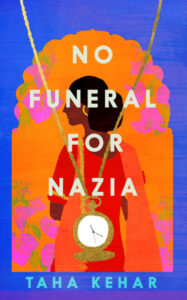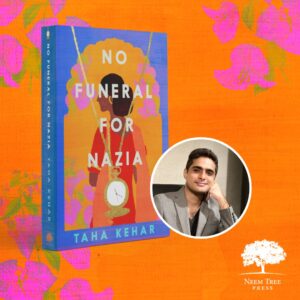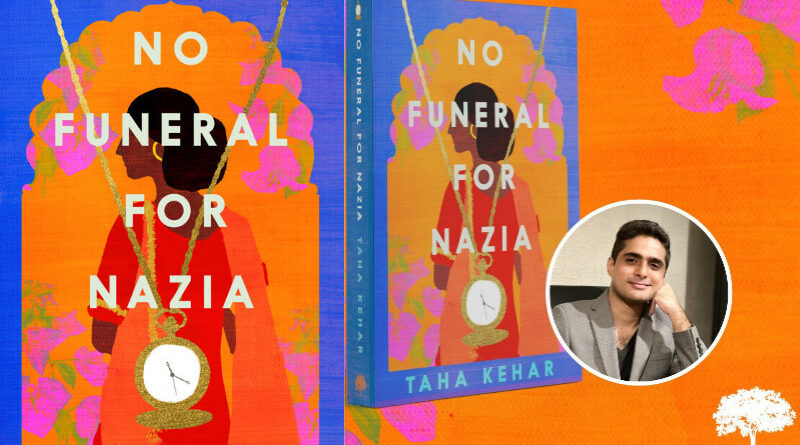Taha Kehar’s No Funeral for Nazia published by Neem Tree Press is a witty tale that challenges social conventions and narrates the story of Nazia Sami, a celebrated author who in her final days, wields pen one last time and leaves a trail of instructions for her sister, Naureen. It is a striking and inventive exploration of what death can mean for both the deceased and those left behind. With death as the prevailing theme, the story gives you a multi-narrative perspective on why Nazia challenges funeral traditions and chooses to ‘speak your heart out’ to ‘aimless tears shedding’ as her way to say goodbye to her family.
You are a storyteller so tell us your story. How do you get into the realm of literature?
As a child, I enjoyed telling and hearing stories. While there are various mediums through which you can tell a story, I decided to write novels because I was intrigued by the alchemy of the written word. A single sentence, if penned with precision and care, has the power to evoke an entire world for readers. Literature allows us to inhabit worlds we’ll never see and experience lives we’ll never live. Writing novels, therefore, helped me become more conscious of my surroundings. Each book is a creative challenge. Yet, writing feels like the most natural thing for me to do.
Why is it “No Funeral for Nazia” and not “No Funeral for Natasha”? How did you select the name for your story or characters? Are they based on real people?
The name ‘Nazia’ means ‘someone to be proud of’ in Urdu. However, no one is proud of Nazia Sami in No Funeral for Nazia. Her friends and family despise her for making controversial choices. Many of them even consider her to be arrogant, self-serving and cruel. Naming the protagonist ‘Nazia’ was a study in contrast. I saw it as an opportunity to depict the contradictions in her personality.
 Little or no thought went into the names of the other characters. Women characters who are close to Nazia’s age – Naureen, Parveen and Durdana – were also given nicknames. Nazia’s name isn’t distorted to ‘Nazo’ or (God forbid!) ‘Nazi’. This, of course, was a conscious decision.
Little or no thought went into the names of the other characters. Women characters who are close to Nazia’s age – Naureen, Parveen and Durdana – were also given nicknames. Nazia’s name isn’t distorted to ‘Nazo’ or (God forbid!) ‘Nazi’. This, of course, was a conscious decision.
The title of the novel reflects Nazia’s revolt against the accepted rituals of death. For her family and friends, it is a command to follow her wishes. For the reader, it is a reminder that this is Nazia’s story, even if she is an ‘absence’ throughout the novel’s linear trajectory.
Are there any such vocabulary/concepts in this book in the context of South Asian/Pakistani society that you think may be new to global readers? Define some of those.
I have prepared a glossary of words and references at the end of the novel to assist readers who aren’t familiar with Pakistan. I usually avoid a glossary as it is frowned upon by some people as an attempt to pander to a Western reader. However, the glossary for No Funeral for Nazia was essential because the novel makes reference to the rites and rituals associated with death in Muslim societies – something not everyone would be familiar with. A glossary also helped me understand how some words in Urdu are being blithely distorted over time.
What cultural values do you see in storytelling?
Storytelling tells us about people who may or may not be like us, but have seemingly familiar emotional reactions to complex social situations. It’s an opportunity to learn about others, build bridges and develop empathy.
As a journalist, how does it feel when the mic turns around? What question do you wish someone would ask about “No Funeral for Nazia” but nobody has?
I would love to be asked more questions about the psychology behind Nazia’s decision to have a party instead of a funeral. In fact, I’d like readers to ask themselves what circumstances would compel someone to sidestep traditions and make this unusual choice.”
 How important are book reviews? Do you read your book reviews? Any book reviews or critical insights that inspired you recently?
How important are book reviews? Do you read your book reviews? Any book reviews or critical insights that inspired you recently?
I do enjoy reading book reviews because I’m curious about readers’ interpretation of my work. More often than not, a reviewer tends to express a thought that is buried deep in a writer’s subconscious. For instance, a thought-provoking review of my previous novel, Typically Tanya, encouraged me to ponder over the hidden psychological traumas faced by my protagonist.
What is your anecdote for aspiring writers?
Writing is a journey with good and bad moments. Brace yourself for the challenges and don’t get too smug about your successes. I also believe writers shouldn’t stop writing for themselves in the quest to write for an audience.’
It is not easy to write about a character as controversial as Nazia- whose imaginative instructions, written in red ink, have the power to give a heart attack to almost everyone living on this side of the globe. We are interested in the wild inspiration behind this.
I prefer writing about characters who make unusual choices. Nazia is, therefore, a perfect example of a character I’d been drawn towards. I decided against making an overpowering presence throughout the novel to preserve the aura of mystery surrounding her life.
Instead, I felt it would be more interesting if her friends and family put the pieces of her life together. By giving the other characters the power to tell Nazia’s story, I’d be able to present a more objective image of the protagonist. At the same time, this would allow me to explore how our public image differs from our self-image.
Daphne du Maurier’s Rebecca was, undoubtedly, an inspiration as it presents a stunning portrait of a protagonist who is absent from the novel’s linear arc.
Who is the target reader for “No Funeral for Nazia”? What is your message to them?
No Funeral for Nazia will appeal to readers who would enjoy a contemporary mystery novel set in the South Asian context. However, I wouldn’t want the novel to be read as just another mystery novel. I’d like it to be seen as a meditation on Karachi’s (Pakistan) troubled past and how it has shaped the lives of its citizens.
We heard you are exploring the theme of male friendships for your next book. Tell us more.
Male friendships have often been depicted in a stereotypical manner. Men are often portrayed as ‘fist-pumping bros’ who bond over sports and seldom discuss their emotions. For my next novel, I’d like to move beyond this stereotype and capture a different vein of truth about male friendships. The idea seemed promising, but I’ve struggled to write organically about it. I find it easier to write women characters as I grew up around women of all ages. In order to give myself some creative impetus, I’ve started to become more conscious about my own friendships with men.
I haven’t started writing the novel as I’m still deciding whether this theme will be a fragment of a larger whole or the project unto itself. But, even so, I’d like to see how I can push my creative boundaries through this motif.”
No Funeral for Nazia is published by NeemTree Press (UK) and being launched (today) October 19th, 2023.











